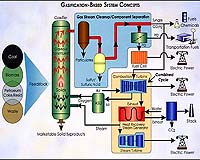More on Gasification, Plus Biofuels vs Foods Illusion
 As mentioned previously, Exxon is pairing with Pratt & Whitney / Rocketdyne to develop efficient gasification technologies for clean coal technology and producing hydrocarbon chemicals and fuels from biomass.
As mentioned previously, Exxon is pairing with Pratt & Whitney / Rocketdyne to develop efficient gasification technologies for clean coal technology and producing hydrocarbon chemicals and fuels from biomass."Gasification technology has the potential to help with many of our most pressing energy challenges and we are pleased to be involved in this important project, said Rich Pisarczyk, president of ExxonMobil Research and Engineering Company.Meanwhile, the tired old debate of biofuels vs. foods continues among UN officials and other uninformed, self-important functionaries.
"Turning coal and similar energy sources into synthesis gas would allow these sources to be converted into a range of products, including chemicals, transportation fuels and power plant feedstock. Gasification also helps enable the adoption of carbon capture and storage and therefore reduces emissions from the use of coal and other heavy feedstocks.
Work has begun on pilot plants to test the technology at the Gas Technologies Institute in Des Plaines, Illinois, and the Energy and Environmental Research Center in Grand Forks, North Dakota. ExxonMobil is also cooperating with Pratt and Whitney Rocketdyne to assist in identifying potential interested parties for demonstration.
The collaboration takes advantage of ExxonMobil's technology leadership in the energy sector and Pratt and Whitney Rocketdyne's experience in rocket-engine development, with the goal of making real progress in gasification technology. _energy-daily
As a society’s wealth increases, its energy consumption rises far more quickly than its food consumption - in fact, food consumption eventually plateaus because people can only fit so much into their stomachs. This very fact is leading to a revolution — the result of which will be that, in the future, we will view fuel as a more important outcome from growing crops than food.It is truly a debate for those who have nothing important to do with their time. People like college professors, government bureaucrats, political activists, and similar pseudo intellectual lightweights who get paid a lot of money for eating, drinking, and excreting.
So, if biofuels are here to stay, how can the global community prevent millions of people from falling into famine due to competition of food land with biofuel land when biofuel land turns out to be more profitable? _gas2org
In the real world, one does not think about feeding 9 billion or 10 billion people--now or in the future. In the real world, one sets about developing local and regional solutions for all parts of the world. Solutions which the people themselves can implement and operate, if possible. Trying to solve all problems for all people with one policy is the mark of an idiot.
Labels: food vs. fuels, gasification

0 Comments:
Post a Comment
Subscribe to Post Comments [Atom]
<< Home